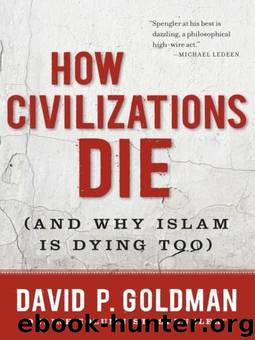How Civilizations Die: (And Why Islam Is Dying Too) by Goldman David

Author:Goldman, David [Goldman, David]
Language: eng
Format: mobi
ISBN: 9781596982802
Publisher: Regnery Publishing
Published: 2011-09-19T00:00:00+00:00
A God of Love Is a God of Laws
What is it that unites Catholic Thomists and evangelical Biblicists—as well as observant Jews—but separates all of them from Muslims? It is the biblical belief that God loves his creatures. A loving God, the Bible asserts, places man in a world that he can comprehend, which is to say that God establishes order in the universe out of love for humankind. We live in a world sufficiently comprehensible for us to adapt nature to our needs. Heavenly bodies do not act capriciously (either as pagan deities, or at Allah’s arbitrary whim); rather, they are lamps and clocks placed in the sky for the benefit of humankind. If God were not good, the world might not be as hospitable to humans as it is. Such a state of affairs is unimaginable to Christians or Jews. But not to Muslims, who believe that Allah can make any sort of world he wants—or indeed a different world from one day to the next.
A God of love is also a God of laws. For man to survive and prosper in the natural world, he must be able to understand enough of the laws of nature to plant crops and smelt iron and split atoms. This is not only a statement about nature but about the rightly constituted state. The biblical God places limits on his own powers by granting to man what the politicians later called inalienable rights. No one in a position of power, from kings and presidents down to the cop on the beat, may act arbitrarily, for the Covenant establishes a bond between God and every individual, whose rights are protected by laws that no earthly authority can disregard.
Allah is not a God of laws because he is not a God of love. It is possible for Muslims to love Allah, but nonsensical to imagine that God loves Muslims, declared Abu Hamid al-Ghazali (1058–1111), still the dominant authority in normative Islam. A leading Western historian of Islam calls him the most influential figure in Islam since the Prophet Mohammed,6 and such putative updaters of Islam as Tariq Ramadan still base their theology on al-Ghazali. “When there is love, there must be in the lover a sense of incompleteness; a recognition that the beloved is needed for complete realization of the self,” al-Ghazali wrote. But since Allah is perfect and complete, this notion of love is nonsensical. “There is no reaching out on the part of God...there can be no change in him; no development in him; no supplying of a lack in Himself.”7
Allah is beyond love and has therefore has no need to favor humankind with laws of nature. As al-Ghazali argues,
The connection between what is habitually believed to be a cause and what is habitually believed to be an effect is not necessary, according to us. For example, there is no causal connection between the quenching of thirst and drinking, satiety and eating, burning and contact with fire. Light and the appearance of the sun, death and decapitation, healing and the drinking of medicine.
Download
This site does not store any files on its server. We only index and link to content provided by other sites. Please contact the content providers to delete copyright contents if any and email us, we'll remove relevant links or contents immediately.
| Buddhism | Christianity |
| Ethnic & Tribal | General |
| Hinduism | Islam |
| Judaism | New Age, Mythology & Occult |
| Religion, Politics & State |
Cecilia; Or, Memoirs of an Heiress — Volume 1 by Fanny Burney(31332)
Cecilia; Or, Memoirs of an Heiress — Volume 3 by Fanny Burney(30934)
Cecilia; Or, Memoirs of an Heiress — Volume 2 by Fanny Burney(30889)
The Secret History by Donna Tartt(16620)
Sapiens: A Brief History of Humankind by Yuval Noah Harari(13050)
Leonardo da Vinci by Walter Isaacson(11901)
The Radium Girls by Kate Moore(10907)
Sapiens by Yuval Noah Harari(4534)
The Wind in My Hair by Masih Alinejad(4424)
How Democracies Die by Steven Levitsky & Daniel Ziblatt(4398)
Homo Deus: A Brief History of Tomorrow by Yuval Noah Harari(4276)
Endurance: Shackleton's Incredible Voyage by Alfred Lansing(3840)
The Silk Roads by Peter Frankopan(3759)
Man's Search for Meaning by Viktor Frankl(3631)
Millionaire: The Philanderer, Gambler, and Duelist Who Invented Modern Finance by Janet Gleeson(3568)
The Rape of Nanking by Iris Chang(3515)
Hitler in Los Angeles by Steven J. Ross(3435)
The Motorcycle Diaries by Ernesto Che Guevara(3332)
Joan of Arc by Mary Gordon(3257)
